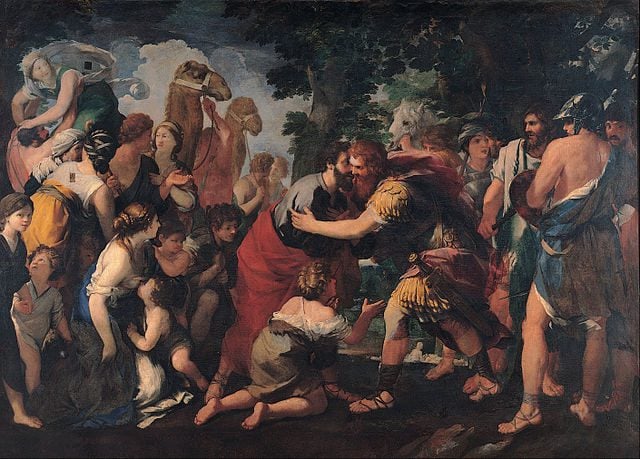
Meeting between Esau and Jacob, by Giovanni Maria Bottalla (1613-1644) [public domain / Wikimedia Commons]
(4-22-10)
*****
The Great Calvinist Bible Argument: their favorite by far, and one trumpeted endlessly, is Romans 9. Here is the portion that Calvinists employ to defend their theological system of TULIP:
Romans 9:6-24 (RSV) But it is not as though the word of God had failed. For not all who are descended from Israel belong to Israel, [7] and not all are children of Abraham because they are his descendants; but “Through Isaac shall your descendants be named.” [8] This means that it is not the children of the flesh who are the children of God, but the children of the promise are reckoned as descendants. [9] For this is what the promise said, “About this time I will return and Sarah shall have a son.” [10] And not only so, but also when Rebecca had conceived children by one man, our forefather Isaac, [11] though they were not yet born and had done nothing either good or bad, in order that God’s purpose of election might continue, not because of works but because of his call, [12] she was told, “The elder will serve the younger.” [13] As it is written, “Jacob I loved, but Esau I hated.” [14]What shall we say then? Is there injustice on God’s part? By no means! [15] For he says to Moses, “I will have mercy on whom I have mercy, and I will have compassion on whom I have compassion.” [16] So it depends not upon man’s will or exertion, but upon God’s mercy. [17] For the scripture says to Pharaoh, “I have raised you up for the very purpose of showing my power in you, so that my name may be proclaimed in all the earth.” [18] So then he has mercy upon whomever he wills, and he hardens the heart of whomever he wills. [19] You will say to me then, “Why does he still find fault? For who can resist his will?” [20] But who are you, a man, to answer back to God? Will what is molded say to its molder, “Why have you made me thus?” [21] Has the potter no right over the clay, to make out of the same lump one vessel for beauty and another for menial use? [22] What if God, desiring to show his wrath and to make known his power, has endured with much patience the vessels of wrath made for destruction, [23] in order to make known the riches of his glory for the vessels of mercy, which he has prepared beforehand for glory, [24] even uswhom he has called, not from the Jews only but also from the Gentiles?
This seems very strong and invulnerable, but it is also almost unique in the Bible, in its pattern of argument or presentation, as we can see from all the other scriptures collected above. Is there a way to exegete this in a fashion that is consistent with a non-Calvinist interpretation of predestination and election, over against the distinctive Calvinist doctrines of TULIP?
One possible (and to me, quite plausible) way of providing a non-Calvinist take of Romans 9 came from Protestant apologist James Patrick Holding, drawing in turn from scholar Marvin Wilson’s Our Father Abraham, and the notion of Hebrew “block logic”. Wilson’s writings include A Workbook for New Testament Greek: Grammar and Exegesis in First John and Dictionary of Bible Manners and Customs (with highly respected evangelical scholars Edwin Yamauchi and R. K. Harrison). Holding writes:
Let me state further that Wilson’s “block logic” comment is further substantiated by points made in Pilch and Malina’s Handbook of Biblical Social Values, which describes the ancient mind as one practiced in dualistic thought. Put another way, there is no “middle ground” where neutral value is assigned, and expressions are made in terms of “black and white”. I would add that Wilson is far from my only source; nor are Pilch and Malina, as indeed in the same article I go on to relate the matter to Ecclesiastes, based on solid OT scholarship. . . .
Hebrew “block logic” operated on similar principles. “…[C]oncepts were expressed in self-contained units or blocks of thought. These blocks did not necessarily fit together in any obviously rational or harmonious pattern, particularly when one block represented the human perspective on truth and the other represented the divine. This way of thinking created a propensity for paradox, antimony, or apparent contradiction, as one block stood in tension — and often illogical relation — to the other. Hence, polarity of thought or dialectic often characterized block logic.” Examples of this in practice are the alternate hardening of Pharaoh’s heart by God, or by Pharaoh himself; and the reference to loving Jacob while hating Esau — both of which, significantly, are referred to often by Calvinist writers.
Wilson continues: “Consideration of certain forms of block logic may give one the impression that divine sovereignty and human responsibility were incompatible. The Hebrews, however, sense no violation of their freedom as they accomplish God’s purposes.” The back and forth between human freedom and divine sovereignty is a function of block logic and the Hebrew mindset. Writers like Palmer who proudly declare that they believe what they read in spite of what they see as an apparent absurdity are ultimately viewing the Scriptures, wrongly, through their own Western lens in which they assume that all that they read is all that there is.
What this boils down to is that Paul presents us with a paradox in Romans 9, one which he, as a Hebrew, saw no need to explain. “..[T]he Hebrew mind could handle this dynamic tension of the language of paradox” and saw no need to unravel it as we do. And that means that we are not obliged to simply accept Romans 9 at “face value” as it were, because it is a problem offered with a solution that we are left to think out for ourselves. There will be nothing illicit about inserting concepts like primary causality, otherwise unknown in the text.
. . . as we have noted, expression in extremes is not a characteristic of Hebrew thought alone.
Second and more importantly, Paul was a Hebrew; he quotes from sources in Hebrew . . . and communicating in Greek changes neither of these points. Indeed, linguistic studies by such as Casey indicate . . . that bilingual interference points to Paul preserving his Hebrew linguistic and thought-forms, even as he communicates in Greek. . . .
It remains that Paul is not making a logical argument, any more than God made one (or had to) before Job. Indeed, the example of Job points to what I am talking about, and what Wilson otherwise relates: The Hebrews had experienced God personally at Sinai; it would be absurd to come to such people and say (for example), “You need the logic of the kalam cosmological argument to prove that God exists.” . . . Romans 9 is no “answer” at all in the Western sense; like the book of Job, it is God from the whirlwind saying, “That’s none of your concern.”
. . . I agree that mercy and compassion — the offering of covenant kinship and consideration — are free. It is once we are within that relationship that rewards and punishments begin to come into play . . . Nevertheless this does not prove in any sense that God did not create people with certain characteristics that suited His purposes. . . . And yes, there does remain a contrast, in my view, between mercy and hardening: It is the stark contrast between covenant concern and non-covenant disregard. And yes, the will of God is to decide who He enters into kinship relationships with. But no, this still doesn’t eliminate characteristics as a factor in God choosing people for specific assignments; and it does not eliminate free choice of humans as a factor in salvation . . .
For more on this sort of analysis of Hebrew “block logic” and Hebrew thought in general, see:
The Hebrew Mind vs. the Western Mind (Brian Knowles)
Hebrew Thought Compared to Greek (Western) Thought (N’tan Lawrence)
The Bible Idea of Time: How Archaic Hebrew Thought Is Constructed Differently than Our Thought Today (Kerry A. Shirts)
Biblical Paradox: Does Revelation Challenge Logic? (David Basinger, Journal of the Evangelical Theological Society, June 1987, 205-213)
St. John Chrysostom interpreted this passage in a non-Calvinistic fashion also:
Paul says this in order not to do away with free will but rather to show to what extent we ought to obey God. We should be as little inclined to call God to account as a piece of clay is.” (Homilies in Romans 16, NPNF 1 11:467)
God does nothing at random or by mere chance, even if you do not understand the secrets of his wisdom. You allow the potter to make different things from the same lump of clay and find no fault with him, but you do not grant the same freedom to God! . . . How monstrous this is. It is not on the potter that the honor or dishonor of the vessel depends but rather on those who make use of it. It is the same way with people – it all depends on their own free choice.” (Homilies on Romans 16.46; NPNF 1 11:468)
Methodist commentator Adam Clarke provides another plausible non-Calvinist take on Paul’s mention of Jacob and Esau:
Verse 12. The elder shall serve the younger] These words, with those of Malachi, Jacob have I loved, and Esau have I hated, are cited by the apostle to prove, according to their typical signification, that the purpose of God, according to election, does and will stand, not of works, but of him that calleth; that is, that the purpose of God, which is the ground of that election which he makes among men, unto the honour of being Abraham’s seed, might appear to remain unchangeable in him; and to be even the same which he had declared unto Abraham. That these words are used in a national and not in a personal sense, is evident from this: that, taken in the latter sense they are not true, for Jacob never did exercise any power over Esau, nor was Esau ever subject to him. Jacob, on the contrary, was rather subject to Esau, and was sorely afraid of him; and, first, by his messengers, and afterwards personally, acknowledged his brother to be his lord, and himself to be his servant; see Gen. xxxii. 4; xxxiii. 8, 13. And hence it appears that neither Esau nor Jacob, nor even their posterities, are brought here by the apostle as instances of any personal reprobation from eternity: for, it is very certain that very many, if not the far greatest part, of Jacob’s posterity were wicked, and rejected by God; and it is not less certain that some of Esau’s posterity were partakers of the faith of their father Abraham.
. . . Verse 21. Hath not the potter power over the clay] The apostle continues his answer to the Jew. Hath not God shown, by the parable of the potter, Jer. xviii. 1, &c., that he may justly dispose of nations, and of the Jews in particular, according as he in his infinite wisdom may judge most right and fitting; even as the potter has a right, out of the same lump of clay, to make one vessel to a more honourable and another to a less honourable use, as his own judgment and skill may direct; for no potter will take pains to make a vessel merely that he may show that he has power to dash it to pieces? For the word came to Jeremiah from the Lord, saying, Arise, and go down to the potter’s house, and there I will cause thee to hear my words. Then I went down to the potter’s house, and, behold, he wrought a work upon the wheels. And the vessel that he made of clay was marred in the hands of the potter: so he made it again another vessel, as seemed good to the potter to make it. It was not fit for the more honourable place in the mansion, and therefore he made it for a less honourable place, but as necessary for the master’s use there, as it could have been in a more honourable situation. Then the word of the Lord came to me, saying, O house of Israel, cannot I do with you as this potter? Behold, as the clay is in the potter’s hand, so are ye in mine hand, O house of Israel. At what instant I shall speak concerning a nation, and concerning a kingdom, to pluck up, and to pull down, and to destroy it; if that nation, against whom I have pronounced, turn from their evil, I will repent of the evil that I thought to do unto them. And at what instant I shall speak concerning a nation-to build and to plant it; is it do evil in my sight, that it obey not my voice, then I will repent of the good wherewith I said I would benefit them. The reference to this parable shows most positively that the apostle is speaking of men, not individually, but nationally; and it is strange that men should have given his words any other application with this scripture before their eyes.
Verse 22. What if God, willing to show his wrath] The apostle refers here to the case of Pharaoh and the Egyptians, and to which he applies Jeremiah’s parable of the potter, and, from them, to the then state of the Jews. Pharaoh and the Egyptians were vessels of wrath-persons deeply guilty before God; and by their obstinate refusal of his grace, and abuse of his goodness, they had fitted themselves for that destruction which the wrath, the vindictive justice of God, inflicted, after he had endured their obstinate rebellion with much long-suffering; which is a most absolute proof that the hardening of their hearts, and their ultimate punishment, were the consequences of their obstinate refusal of his grace and abuse of his goodness; as the history in Exodus sufficiently shows. As the Jews of the apostle’s time had sinned after the similitude of the Egyptians, hardening their hearts and abusing his goodness, after every display of his long-suffering kindness, being now fitted for destruction, they were ripe for punishment; and that power, which God was making known for their salvation, having been so long and so much abused and provoked, was now about to show itself in their destruction as a nation. But even in this case there is not a word of their final damnation; much less that either they or any others were, by a sovereign decree, reprobated from all eternity; and that their very sins, the proximate cause of their punishment, were the necessary effect of that decree which had from all eternity doomed them to endless torments. As such a doctrine could never come from God, so it never can be found in the words of his apostle. (Clarke’s Commentary)













